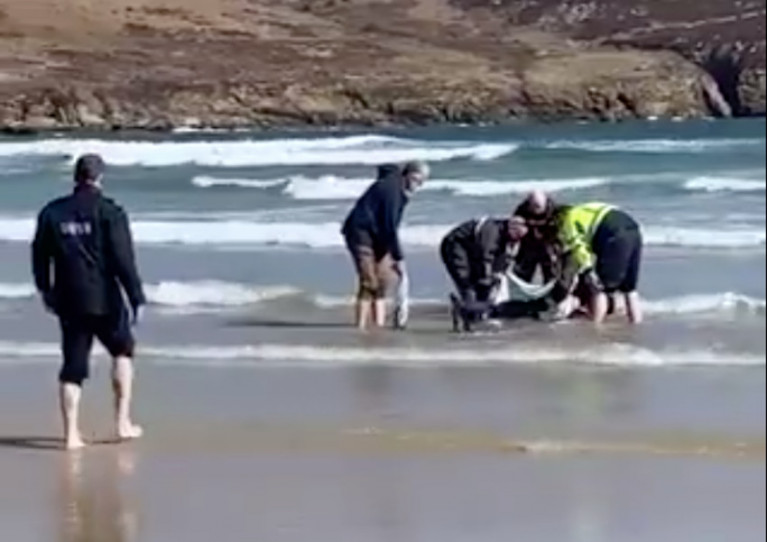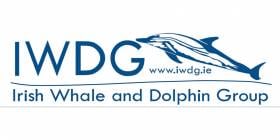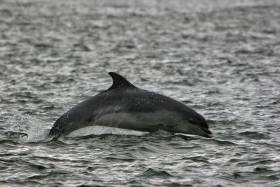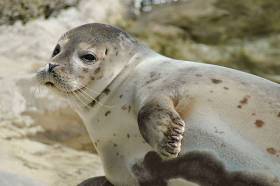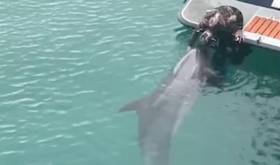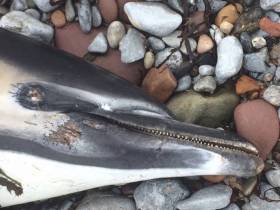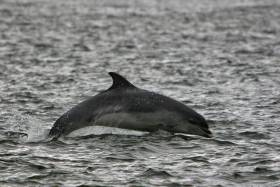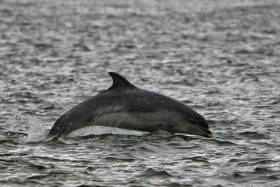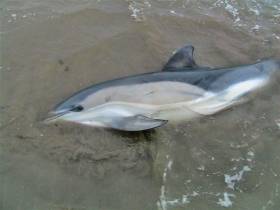Displaying items by tag: Dolphins
Garda & Coastguard Volunteers Rescue Beached Dolphin In Donegal
Two gardaí teamed up with local coastguard volunteers to help refloat a beached dolphin in Co Donegal yesterday (Monday 13 April).
The Garda Review Twitter account shared video of the remarkable rescue at Killahoey Beach as the small group of Good Samaritans worked to carry the stranded marine mammal into swimmable waters.
The Irish Mirror has more on the story HERE.
UTTERLY AMAZING VIDEO JUST SHOT @ KILLAHOE BEACH, Co. DONEGAL. Gardaí Brendan O’Connor & Sean Sharkey assisting the Mulroy Coastguard team in the return of a beached Dolphin Whale to the sea. Incredible. #Gardai #RTE #BBC #TG4 @IWDGnews pic.twitter.com/YjLGxH6pzX
— Garda Review (@GardaReview) April 13, 2020
UK’s Natural History Museum Releases Decades Of 20th Century Whale & Dolphin Stranding Records
#MarineWildlife - The UK’s Natural History Museum has made available for the first time a vast trove of whale and dolphin stranding records in British and Irish waters.
The data covers the years 1913 to 1989, filling in a significant gap before the Irish Whale and Dolphin Group’s stranding scheme began in 1991.
Over the years many entries were submitted by the coastguard, fishermen and members of the public — including a detailed record of a harbour porpoise found in Co Cork in 1913, the very first card in the data set.
PhD candidate Ellen Coombs is combing through the records to determine what picture “one of the longest systematic cetacean stranding data sets in the world” reveals for the status of cetacean species in our waters.
And already there have been some important finds, such as occasional records of deep-diving Cuvier’s beaked whales over the decades — not to mention a double stranding of narwhals in 1949.
The data also correlates with already known trends, such as the sharp decline in blue whale records with the expansion of commercial whaling in the early 20th century.
The Natural History Museum website has more on the story HERE.
Whale & Dolphin Strandings In Cork This Week ‘Only A Percentage Of What Is Actually Dead At Sea’
#MarineWildlife - Unusual weather for this time of year may be responsible for a recent spate of whale and dolphin strandings on the Cork coast in the past week.
The Irish Examiner reports that among the eight strandings were the carcass of a sperm whale on Long Strand in West Cork and a dolphin with fishing line around its beak in Schull.
However, the Irish Whale and Dolphin Group’s (IWDG) Mick O’Connell said that while the statistic was high within such a short timeframe, it was not necessarily a mystery.
“We normally get the same thing every year,” said the IWDG stranding officer. “It is usually more in the southwest and west, but this year, I suppose we have had more southeast winds, which probably explains it.”
O’Connell added that the strandings are “only a percentage of what is actually dead at sea” — and that post-mortems may “shed some light in their deaths”.
The Irish Examiner has more on the story HERE.
Kerry Gas Terminal Plan Faces Legal Challenge Over Dolphin Habitat & Changes In Climate Law
#CoastalNotes - Extension of planning permission for a €500 million gas terminal at Ballylongford on the Kerry coast now faces judicial review, as Green News reports.
Friends of the Irish Evironment (FiE) was granted leave in the High Court to review An Bord Pleanála’s decision to extend permission originally granted in 2008, on the basis that relevant climate law has changed in recent years.
FiE also contends that the environmental assessment submitted with the original application does not take into account a later survey of the area by the National Parks and Wildlife Service.
This 2012 survey identified the earmarked site for the terminal’s jetty as a “critical habitat” for bottlenose dolphins.
Green News has much more on the story HERE.
Seals Released Off North Coast After Extended Exploris Stay
#MarineWildlife - Two common seals were released off the North Coast last week after being nursed back to health at the Exploris aquarium in Portaferry.
According to The Irish News, the seals named Hans and Albert had been with the sanctuary since the summer, when they arrived with various injuries.
However, by September both had put on weight and were eating by themselves, prompting Exploris staff to plan for their eventual release at Ballintoy Harbour last Wednesday (29 November).
In a techy twist, Hans and Albert have been microchipped so their progress can be monitored from shore over the next few weeks and months.
Also in the care of Exploris staff is a baby seal rescued from a rocky outcrop off Bangor in Belfast Lough in late October.
BBC News has video of the tiny white seal pup, which was suspected to have an injured hip and damaged flipper likely suffered during Storm Ophelia.
Another presumed victim of the stormy weather was a seal recovered from Dun Laoghaire’s East Pier on Hallowe’en.
The Irish Times reports that the marine mammal had sustained injuries to its face and rear flipper, but was said to be doing well in the care of volunteers from the Courtown Seal Rescue Centre in Co Wexford.
More recently, a number of stranded dolphins were successfully returned to the water off Achill Island by locals and volunteers on Tuesday 21 November.
Four common dolphins were reflected from Keem Beach, though a fifth was found dead on nearby rocks. The Irish Whale and Dolphin Group (IWDG) removed the carcass to determine its cause of death, as the Mayo News reports.
Back on the North Coast, BelfastLive says a six-metre whale carcass surprised locals at Runkerry Strand near Portballintrae on 24 November.
The find came just weeks after a much larger fin whale carcass was found on Arranmore off the Donegal coast, as previously reported on Afloat.ie.
Dusty The Dolphin Makes A Friend At Inis Oírr
#MarineWildlife - Dusty the dolphin earned a measure of infamy in previous years after attacking a number of bathers at her former home in Doolin.
But the Wild Atlantic Way’s other resident bottlenose – after Dingle's celebrated Fungie – was in a much more agreeable mood in recent days, as a new video captured by visitor Elaine Farrell shows her adorable encounter with a snorkeller at Inis Oírr.
Dusty appears perfectly calm as she rolls over in the water for a belly rub from the diver, who was perched at the stern of a boat moored in the Aran Islands harbour.
However, as cute as that encounter might be, the Irish Whale and Dolphin Group’s Dr Simon Berrow warns that Dusty and other dolphins like her are still wild animals — and getting close to them can be dangerous.
“Our advice would be: don’t swim with the dolphins,” he said, adding: “Respect their distance and don’t do anything stupid. It’s hard to know what will set off aggressive behaviour.”
Elsewhere, video from the Copeland Islands off Donagahdee show a lazy seal taking it easy on a dinghy moored off the Irish coast recently.
2017 ‘Worst Year On Record’ For Whale & Dolphin Strandings
#MarineWildlife - Not even two months in and 2017 is already the worst year on record for whale and dolphin strandings, according to the Irish Whale and Dolphin Group (IWDG).
As of Friday 17 February, a whopping 56 cetacean standings had been recorded — more than half of them identified as common dolphins.
Prior to 2010, the average numbers of standings were around 22, of which five would have been common dolphins, says the IWDG’s strandings officer Mick O’Connell.
The question of what is happening to cause such a spike in strandings throughout this decade prompted a meeting between the IWDG, Government agencies and representatives from Irish and European fishing fleets earlier this week.
“There is a disconnect somewhere,” says O’Connell, “as internationally accepted visual evidence of bycatch is seen in some strandings, and post-mortem reports on five common dolphins in Mayo in 2013 reported that their deaths were likely to be due to bycatch in a pelagic trawl net, yet Irish and EU observer schemes involving pelagic trawlers reported no bycatch in commercial pelagic hauls.”
The latest stranding was recorded in Fenit, Co Kerry on Wednesday (15 February) — a dolphin alleged by locals to have been caught in the nets of a large trawler offshore before being dumped overboard, as the Irish Mirror reports.
The Irish Examiner adds that another common dolphin with blood marks was found at Ballyconneely Beach in Connemara on the same day, while two days previous the emaciated carcass of a sperm whale was found on Nethertown Beach at the most south-easterly point of Co Wexford.
Last month, a spate of marine wildlife standings on the Waterford coast was blamed on pair trawling activity in the area.
NI Scientists Head Whale & Dolphin ‘Listening’ Project
#MarineScience - Scientists from Northern Ireland will lead a new project monitoring whale and dolphin sounds off the Scottish and Irish coasts, as BBC News reports.
The scheme led by the Agri-Food and Biosciences Institute (AFBI) will see a network of buoys deployed with devices to pick up cetacean chatter – as well as potentially harmful ocean sounds from sea traffic or industry.
"Displacement from noise is a very real effect and ... if it doesn't cause them to move will change their behaviours and, at the most acute levels, can cause physical and physiological damage to the animals,” says Dr Adam Mellor of the AFBI.
BBC News has more on the story HERE.
Whales & Dolphins Dominate New Atlas Of Irish Mammals
#MarineWildlife - Ireland’s whales and dolphins feature in a new atlas of the country’s wildlife, as The Irish Times reports.
The Atlas of Mammals in Ireland 2010-2015, published by the National Biodiversity Data Centre, maps the distribution of 77 mammal species both on the island and in its territorial waters.
Cetaceans account for almost a third of this number, among a whopping 68 species of whales and dolphins that frequent Irish waters.
The Irish Whale and Dolphin Group’s Dr Simon Berrow relates his long-term study of the Shannon Estuary’s thriving population of bottlenose dolphins in a book that celebrates an encouraging national habitat for species that struggle not so far from our shores.
Afloat.ie readers might remember a previous atlas concentrating on Ireland’s abundance of marine mammals that was published in 2013, and for which this new book makes a useful comparison.
Common Dolphins Strand In Dungarvan
#MarineWildlife - The Irish Whale and Dolphin Group reports on the stranding of three common dolphins in Dungarvan at the weekend.
Two of the three dolphins were still alive when found on Friday (13 January), though they were in “poor condition”, and one was later confirmed dead. The other was last seen in the area on Saturday and its current status is unconfirmed.
The news comes just days after two common dolphins were refloated after stranding in Tarbert, Co Kerry, as previously reported on Afloat.ie.
It also follows a spate of marine wildlife deaths on the Waterford coast during the week, incidents that have been blamed on pair trawling activity.


























